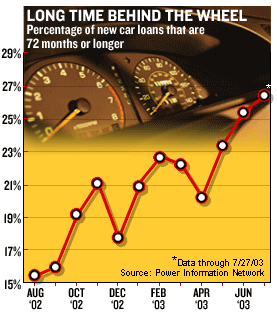NEW YORK (CNN/Money) -
Many new cars today have one feature that is likely to keep running longer than ever before -- their loan payments.
While 60-month, or five-year, car loans still are the most popular, sales data now show that one in four car loans are 72 months or longer.

That's right. Six-year auto loans.
The average length of a car loan, which never reached 60 months until a year ago, reached a record 62 months in July , according to Power Information Network, an affiliate of J.D. Power & Associates.
Loans as long as 84-months -- seven years -- are now offered more widely than ever. Automakers that once offered 72-month loans as a relatively rare option now are offering below-market rates on those six-year loans as another sales incentive. Isuzu is even offering a zero-interest, 72-month loan.
"The new car transaction price is increasing, and people are buying more expensive vehicles and using the longer loans to get payments to more acceptable levels," said Nick Stanutz, executive vice president of Huntington National Bank in Columbus, Ohio. His bank does about a third of its loans longer than 60 months, including about 4 percent at the 84-month level.
The longer loans make for lower monthly payments. An 84-month loan, even at a hefty 8 percent interest rate, produces lower monthly payments than a 60-month loan at 0 percent interest now commonly offered by automakers. And in the current interest rate environment, seven-year loans for less than 4 percent are available from some lenders for those with top credit.
Because long repayment terms can mask the impact of high rates, these loans may appeal to those with poor credit histories, said Bob Kurilko, vice-president of product development for Edmunds.com.
.
Hazards ahead
But longer loans are not the best idea for many buyers, whose remaining loan balance will exceed the value of the car for a much longer period of time due to the slower build-up of loan equity. Since the average age of a vehicle at trade-in is still less than 5-1/2 years, the longer loans could easily leave the buyer with a balance that must be paid off at the time of a trade-in.
| Related stories
|

|
|
|
|
"I can't see why someone with their financial house in order would want one of those loans," said David McKay, senior account director for Power Information Network. "People who are pushing to get payments clipped so desperately may not have the resources to deal with any problems that may arise. Many of these cars will be out of warranty at the time that there are still loan payments. Maybe the better answer is to buy less car. You don't always have to go up in class and features."
Click here for a look at auto stocks
Still, Ford Credit and General Motors Acceptance Corp. say they are only answering customer demand by making the 72-month loans more readily available at incentive rates, such as 1.9 percent on some models.
"This is customer driven to a large extent," said Dan Jarvis of Ford Credit. "They're saying, 'The numbers say I can only afford the Taurus, but I want a Lincoln LS.' People want lower payments and more car."
But he said the 72-month loans are still only about 6 percent of the financing mix at Ford, and are limited to those with top credit ratings.
"We don't plan on making it a big part of our mix," he said.
McKay worries that some buyers are using the longer loans to pay off what they still owe on their trade in as well as make a new car purchase.
As many as 40 percent of new cars buyers over the past six months have been "upside-down" on their trade-in, according to data from the Edmunds.com.
"Then they're not only paying off this car but the last car," McKay said. "The dealer will assist them in finding out how to do that. If they do that enough they could be paying for several cars at once. The payments may seem lower, but something has to give at some point."

|

